#how to do nothing
Quote
When the language of advertising and personal branding enjoins you to “be yourself,” what it really means is “be more yourself,” where “yourself” is a consistent and recognizable pattern of habits, desires, and drives that can be more easily advertised to and appropriated, like units of capital.
Jenny Odell, How to Do Nothing: Resisting the Attention Economy
3K notes
·
View notes
Text
Poor people pay higher time tax
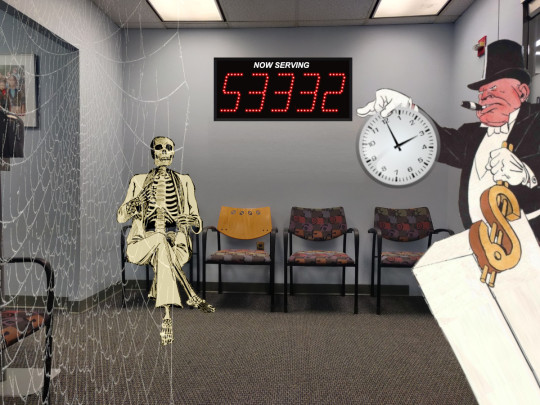
Doubtless you’ve heard that “we all get the same 24 hours in the day.” Of course it’s not true: rich people and poor people experience very different demands on their time. The richer you are, the more your time is your own — not only are many systems arranged with your convenience in mind, but you also command the social power to do something about systems that abuse your time.
If you’d like an essay-formatted version of this post to read or share, here’s a link to it on pluralistic.net, my surveillance-free, ad-free, tracker-free blog:
https://pluralistic.net/2023/02/10/my-time/#like-water-down-the-drain
For example: if you live in most American cities, public transit is slow, infrequent and overcrowded. Without a car, you lose hours every day to a commute spent standing on a lurching bus. And while a private car can substantially shorted that commute, people who can afford taxis or Ubers get even more time every day.
There’s a thick anthropological literature on the ways that cash-poverty translates into #TimePoverty. In David Graeber’s must-read essay “The Utopia of Rules,” he nails the way that capitalist societies generate Soviet-style bureaucracies, especially for poor people. Means-testing for benefits means that poor people spend endless hours filling in forms, waiting on hold, and lining up to see caseworkers to prove that they are among the “deserving poor” — not “mooches” who are defrauding the system:
https://memex.craphound.com/2015/02/02/david-graebers-the-utopia-of-rules-on-technology-stupidity-and-the-secret-joys-of-bureaucracy/
The social privilege gradient is also a time gradient: if you can afford a plane ticket, you can travel quickly across the country rather than losing days to the Greyhound or a road-trip. But if you’re even richer, you can pay for TSA Precheck and cut your airport security time from an hour to minutes. Go further up the privilege gradient and you’ll acquire airline status, shaving another hour off the check-in process.
This qualitative account of time poverty is well-developed, but it’s lacked a good, detailed quantitative counterpart, and our society often discounts qualitative work as mere anecdote and insists on having every story converted to numbers before it is taken seriously.
In “Examining inequality in the time cost of waiting,” published this month in Nature Human Behavior, public affairs researchers Steve Holt (SUNY) and Katie Vinopal (Ohio State) analyze data from the American Time Use Survey (AUTS) to produce a detailed, vibrant quantitative backstop to the qualitative narrative about time poverty:
https://www.nature.com/articles/s41562-023-01524-w
(The paper is paywalled, but the authors made a mostly final preprint available)
https://osf.io/preprints/socarxiv/jbk3x/download
The AUTS “collects retrospective time diary data from a nationally representative subsample drawn from respondents to the Census Bureau’s Community Population Survey (CPS) each year.” These time-diary entries are sliced up in 15-minute chunks.
Here’s what they found: first, there are categories of basic services where high-income people avoid waiting altogether, and where low-income people experience substantial waits. A person from a low-income household “an hour more waiting for the same set of services than people from high-income household.” That’s 73 hours/year.
Some of that gap (5%) is attributable to proximity. Richer people don’t have to go as far to access the same services as poorer people. Travel itself accounts for 2% more — poorer people wait longer for buses and have otherwise worse travel options.
A larger determinant of the gap (25%) is working flexibility. Poor people work jobs where they have less freedom to take time off to receive services, so they are forced to take appointments during peak hours.
Specific categories show more stark difference. If a poor person and a wealthy person go to the doctor’s on the same day, the poor person waits 46.28m to receive care, while the wealthy person waits 28.75m. The underlying dynamic here isn’t hard to understand. Medical practices that serve rich people have more staff.
The same dynamic plays out in grocery stores: poor people wait an average of 24m waiting every time they go shopping. For rich people, it’s 15m. Poor people don’t just wait in longer lines — they also have to wait for understaffed stores to unlock the cases that basic necessities are locked behind (poor people also travel longer to get to the grocery store — and they travel by slower means).
A member of a poor household with a chronic condition that requires two clinic visits per month loses an additional five hours/year to waiting rooms when compared to a wealthy person. As the authors point out, this also translates to delayed care, missed appointments, and exacerbated health conditions. Time poverty leads to health poverty.
All of this is worse for people of color: “Low-income White and Black Americans are both more likely to wait when seeking services than their wealthier same-race peer” but “wealthier White people face an average wait time of 28 minutes while wealthier Black people face a 54 minute average wait time…wealthier Black people do not receive the same time-saving attention from service providers that wealthier non-Black people receive” (there’s a smaller gap for Latino people, and no observed gap for Asian Americans.)
The gender gap is more complicated: “Low-income women are 3 percentage points more likely than low-income men and high-income women are 6 percentage points more likely than high-income men to use common services” — it gets even worse for low-income mothers, who take on the time-burdens associated with their kids’ need to access services.
Surprisingly, men actually end up waiting longer than women to access services: “low-income men spend about 6 more minutes than low-income women waiting for service…high-income men spend about 12 more minutes waiting for services than high-income women.”
Given the important role that scheduling flexibility plays in the time gap, the authors propose that interventions like subsidized day-care and afterschool programming could help parents access services at off-peak hours. They also echo Graeber’s call for reduced paperwork burdens for receiving benefits and accessing public services.
They recommend changes to labor law to protect the right of low-waged workers to receive services during off-peak hours, in the manner of their high-earning peers (they reference research that shows that this also improves worker productivity and is thus a benefit to employers as well as workers).
Finally, they come to the obvious point: making people less cash-poor will alleviate their time-poverty. Higher minimum wages, larger earned income tax credits, investments in low-income neighborhoods and better public transit will all give poor people more time and more money with which to command better services.
This week (Feb 13–17), I’ll be in Australia, touring my book Chokepoint Capitalism with my co-author, Rebecca Giblin. We’re doing a remote event for NZ on Feb 13. Next are Melbourne (Feb 14), Sydney (Feb 15) and Canberra (Feb 16/17). More tickets just released for Sydney!
[Image ID: A waiting room, draped with cobwebs. A skeleton sits in one of the chairs. A digital display board reads 'Now serving 53332.' An ogrish, top-hatted figure standing at a podium, yanking a dollar-sign shaped lever looms into the frame from the right. He holds a clock aloft disdainfully, pinched between the thumb and fingers of one white-gloved hand.]
#pluralistic#scholarship#auts#american time use survey#time use#jenny odell#race#graeber#david graeber#how to do nothing#utopia of rules#inequality#gender#time poverty
797 notes
·
View notes
Text


4/13/2024
Hung out at a local Serbian cafe and the coffee and food were delightful.
I’m chipping away bit by bit at residency onboarding requirements.
I’m currently reading How To Do Nothing by Jenny Odell which is excellent, so far I really recommend it!
#emgoesmed#studyblr#studyspo#med student#med school#med studyblr#productivity#coffee#weekend#books#reading#how to do nothing#jenny odell#I have so much on my to do list#but taking a break#to read and drink some good coffee#is very important
83 notes
·
View notes
Text
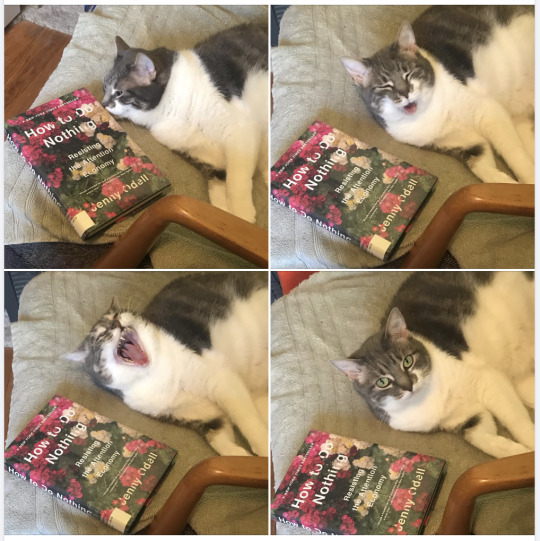
It is useless to attempt to instruct a true master of the form.
#cat#cats#how to do nothing#happy caturday#cat memes#cats and books#how to do nothing book#willow#not trek
122 notes
·
View notes
Text
“Interestingly, my experience suggests that while it initially takes effort to notice something new, over time a change happens that is irreversible. Redwoods, oaks, and blackberry shrubs will never simply be “a bunch of green.” A towhee will never simply be “a bird” to me again, even if I wanted it to be. And it follows that this place can no longer be any place.”
how to do nothing // jenny odell
302 notes
·
View notes
Text
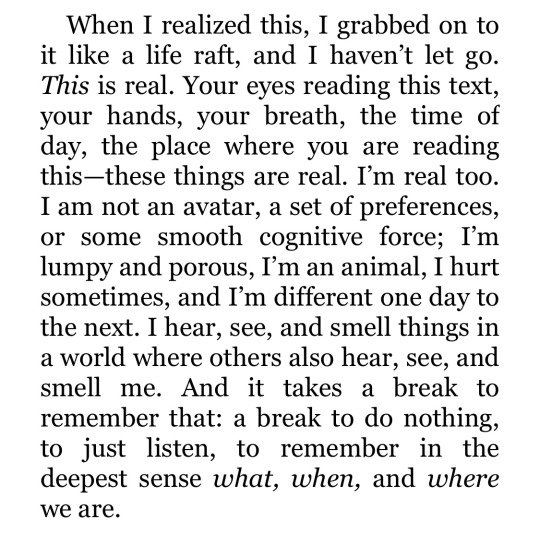
Jenny Odell, How to do nothing
81 notes
·
View notes
Quote
I WANT TO be clear that I’m not actually encouraging anyone to stop doing things completely. In fact, I think that “doing nothing”—in the sense of refusing productivity and stopping to listen—entails an active process of listening that seeks out the effects of racial, environmental, and economic injustice and brings about real change. I consider “doing nothing” both as a kind of deprogramming device and as sustenance for those feeling too disassembled to act meaningfully. On this level, the practice of doing nothing has several tools to offer us when it comes to resisting the attention economy.
The first tool has to do with repair. In such times as these, having recourse to periods of and spaces for “doing nothing” is of utmost importance, because without them we have no way to think, reflect, heal, and sustain ourselves—individually or collectively. There is a kind of nothing that’s necessary for, at the end of the day, doing something. When overstimulation has become a fact of life, I suggest that we reimagine #FOMO as #NOMO, the necessity of missing out, or if that bothers you, #NOSMO, the necessity of sometimes missing out.
That’s a strategic function of nothing, and in that sense, you could file what I’ve said so far under the heading of self-care. But if you do, make it “self-care” in the activist sense that Audre Lorde meant it in the 1980s, when she said that “[c]aring for myself is not self-indulgence, it is self preservation, and that is an act of political warfare.”
Jenny Odell. How to Do Nothing
49 notes
·
View notes
Text
Found this really, really helpful. My mind is always so active; it's hard to just let it come to a resting point.
2 notes
·
View notes
Text
Literally 2 Cents: How to Do Nothing, Vol. 2
Information overload is a type of sensorship -- a new episode from Literally 2 Cents! #podcast #content #literally2cents
We put up our most recent episode this weekend, the second part to our series exploring “How to Do Nothing” by Jenny Odell. This week, we talked about context collapse… you know, how you’ll be scrolling Twitter and see several disparate events that have nothing to do with each other — or with you? Social media and other online content has taken a lot of the context out of how we interact with…
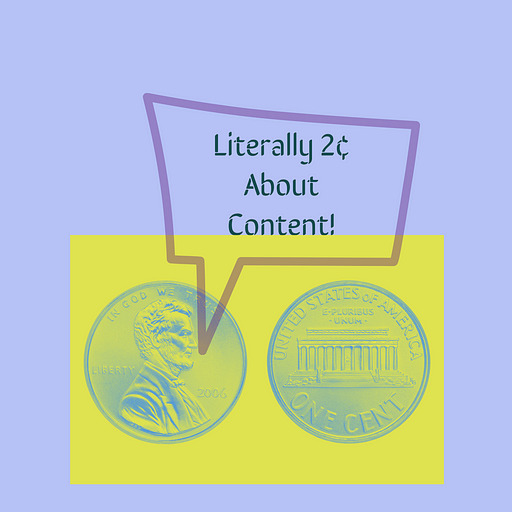
View On WordPress
4 notes
·
View notes
Text
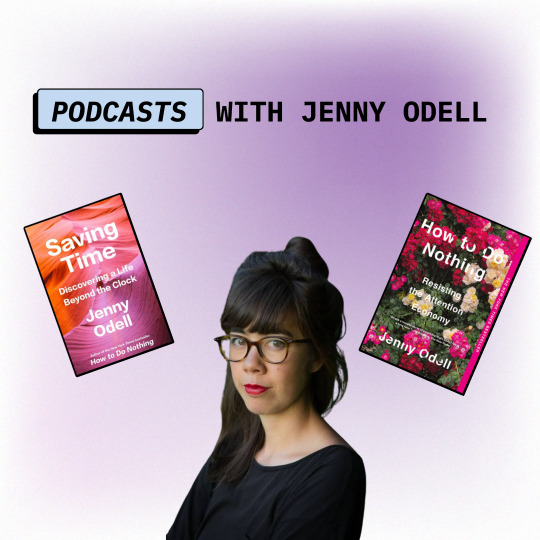
Jenny Odell is an American writer, artist, and educator. Recently she's well known for publishing two books "How to do nothing: Resisting the Attention Economy" and "Saving time: Discovering a Life Beyond the Clock". Her works speak to the way our life succumbed to the whim of capitalistic efficiency and growth-focused systems, and how everything around us morphed to satisfy those two parameters. Both her works are searing in asking the tough questions the answers to which we may know on a subconscious level but sometimes we're too distracted to pursue the solutions. We curated 3 episodes where Jenny talks about her books and about her journey of detangling art, work, and enjoyment from the claws of capitalism.
#jenny odell#how to do nothing#productivity#capitalism#podcasts#podcast#podcast rec#podcast recommendation#interview#anti work#traditional art#art under capitalism
2 notes
·
View notes
Quote
Nothing is so simultaneously familiar and alien as that which has been present all along. Between, under, and amid all these things wound this entity that was older than I was, older than Cupertino. It represented a kind of primordial movement, even if its course had been altered by engineering in the nineteenth century. Long before cars drove from Whole Foods to the Apple campus, the creek moved water from Table Mountain to the San Francisco Bay. It continues to do this just as it always has, and whether I or any other humans care to notice. But when we do notice, like all things we give our sustained attention to, the creek begins to reveal its significance. Unlike the manufactured Main Street Cupertino, it is not there because someone put it there; it is not there to be productive; it is not there as an amenity. It is witness to a watershed that precedes us. In that sense, the creek is a reminder that we do not live in a simulation—a streamlined world of products, results, experiences, reviews—but rather on a giant rock whose other life-forms operate according to an ancient, oozing, almost chthonic logic. Snaking through the midst of the banal everyday is a deep weirdness, a world of flowerings, decompositions, and seepages, of a million crawling things, of spores and lacy fungal filaments, of minerals reacting and things being eaten away—all just on the other side of the chain-link fence.
Jenny Odell, How to Do Nothing: Resisting the Attention Economy
382 notes
·
View notes
Text
“In After the Future, the Marxist theorist Franco “Bifo” Berardi ties the defeat of labor movements in the eighties to rise of the idea that we should all be entrepreneurs. In the past, he notes, economic risk was the business of the capitalist, the investor. Today, though, “‘we are all capitalists’…and therefore, we all have to take risks…The essential idea is that we should all consider life as an economic venture, as a race where there are winners and losers." ... "In the global digital network, labor is transformed into small parcels of nervous energy picked up by the recombining machine…The workers are deprived of every individual consistency. Strictly speaking, the workers no longer exist. Their time exists, their time is there, permanently available to connect, to produce in exchange for a temporary salary. (emphasis mine)"
How to Do Nothing (Jenny Odell, 2019)
#this tumblr is now a notes taking app for my reading#Franco Berardi#Jenny Odell#How to do Nothing#capitalism#text
3 notes
·
View notes
Text
reading “How to Do Nothing: Resisting the Attention Economy” by Jenny Odell is really sparking my Social Theory brain. In chapter two, in her discussion of how communes in the 1960s and other “retreat from capitalism/modern society” projects have failed, she writes that the unpredictability of people is the downfall of these attempts at utopia. and she’s also really emphasizing the way these projects ended up relying on really fascist situations where one person, or a handful of people, were controlling the Ideas of the group while the rest of the group was supposed to comply and Fulfill the Vision of the commune.
and it got me thinking about my therapy, where we’ve been discussing how anxiety (mine included) is fundamentally about seeking control over your own environment, and the fact that you cannot possibly account for the actions of other people all the time drives anxiety into a mad tailspin, and then I thought--
if unchecked anxiety is about a need for control that manifests as a desire to control other people, then a person or people with sufficient power over others is able to execute on that desire to control others, which would IMO lead to a fascist outlook. that is, if you’re deeply anxious about something it makes you want to control other people and if you *can* control other people by some means you probably will try, because you’re not treating the anxiety (letting go of the need to control others, focusing on your own realistic sphere of control).
and while I think that fascism can be created literally in any sufficiently anxious environment, I also think that capitalism’s essential project is to artificially create anxiety (scarcity, hierarchy, etc.) to perpetuate itself. which thus argues that anyone victimized by a capitalist and hierarchic society (i.e., everybody) can take on a fascist outlook in some way as a reaction to that all-consuming anxiety.
feels like this explains the How We Got Here of right-wing fascism (with the targets of the anxiety being mainly minorities and threats to a status quo where the right-wing/conservative world is in power) and ALSO of leftist “activism” attempts at the same, where infighting is often driven by efforts to police one another’s speech, etc. If we can’t control the arbiters of the oppressive system (as they have power and left-wing activists generally don’t) we’re left with exerting control over others--trans people, sex workers, the people who don’t use the right language to talk about an issue, and so on. the efforts to suppress use of the word Queer are an excellent example of this--coalition-building is a HUGE threat to the anxious/fascist brain, because it requires you to trust other people, to relinquish control, and to acknowledge that you cannot ever achieve perfect control.
another great example is the sort of Hays Code-esque censorship of sexual expression and desire. anxiety that the Movement of LGBT rights (note that I don’t use queer here, as this particular brand would generally avoid a word so inherently rejecting normality) will be contaminated and undermined by expressions of non-sanctioned sexuality (kink, polyamory, transness, disabled and nonwhite sexuality, etc.) is driving young leftists especially away from coalition-building and into the arms of a fascist ideology in the guise of progressive thought.
all this to say while I don’t think this theory is all-encompassing, i do think we have to get serious about combating the central anxieties that drive leftist work. get good with yourself, put your mask on first. not only does anxiety lead to burnout, it also is antithetical to the values you’re trying to live up to.
#i don't do long rants on here as much as i used to but#I was seized with passion for the subject#felt like something clicked#jenny odell#how to do nothing#activism
10 notes
·
View notes
Text
April reads

This book was hands down my favourite of the month and definitely one of the best books I've read in a while. It's a classic in art history and a great resource for anyone looking to understand the history of the Russian avant-garde and its precursors. I was not expecting to like it as much as I did because of its age and the context in which it was written. But, to my surprise, this book aged very well. And despite being a book about Russia, written in the USA during the cold war under the mentorship of a figure like Alfred Barr, the book is free of prejudice and a serious study. I especially enjoyed the final chapter, about the 1920s and the Russian avant-garde itself. You can see Grey was particularly passionate about this period, and my interest in it was also the main reason why I decided to read the book. It's also obvious the author worked a great deal with primary sources, since the book brings into the discussion important aspects which are still left out of art historical narratives in the West (especially the ones on the history of modernism in general), even today.

Another great book, although it's more of a short essay. I love Eco's writing and his passion for knowledge. This essay is about libraries, their role in society, and especially about the characteristics that make a good library. It makes you think of everything that libraries could be but sadly aren't.

I read this because I'm interested in this concept of the attention economy and, honestly, because of all the hype the book was receiving online. It had some interesting takes for someone like me, who never read anything on the subject. But overall I would say that, as with most of what's hyped online, it is not worth the attention it gets. It would be much more interesting for me to spend the same amount of time with a book that explained the idea of the attention economy in more detail, instead of wasting so much paper with self-helpy points.
#book review#books and libraries#bookworld#bookstagram#books#book blog#attention economy#jenny odell#how to do nothing#umberto eco#library#art#modern art#art history#history#avantgarde#avantgarde art#constructivism#suprematism#malevich#tatlin#russian art#russia#the russian experiment in art#camila grey#comunism#soviet russia#soviet#soviet union#capitalism
8 notes
·
View notes
Text

"Everything I Need I Get from You will fascinate aficionados, but even for someone who’s never so much as logged on, it makes a rich and heartfelt explainer on the feelings and phenomena that thrive on the internet." —Jenny Odell, author of How to Do Nothing
*EINGIFY (official acronym) also reveals what Harry Styles was actually saying when the images above were taken. you will never guess...
4 notes
·
View notes
Text

They have since left four premature babies to decompose on their beds. They have since kidnapped, stripped, tortured civilians and tried to frame them as Hamas fighters for their propaganda. They have since shot people at refugee camps execution style. They have since targeted academics and poets and directors. They have since killed 86 journalists. Still no ceasefire.
psa: i know that many of us did NOT doubt this for a second, neither did i. this is targeted at the people who educated themselves for the first time about this genocide and discovered the absolute horrific things that Israel is capable of doing to Palestinians, with the unwavering support of its allies.
#i rem clearly that video of the first hospital that was bombed#how israel first denied it and said that it was a failed hamas rocket#then it said it attacked the hospital because hamas was hiding in there#and i rem thinking that this would get every world leader outraged#that they would do everything to stop this genocide#that was too many weeks ago#nothing has changed#this should terrify us all#this could have been us in that hospital#in that house in that refugee camp in that ambulance in that street#nowhere is safe in Palestine#nowhere#free palestine#palestine#free gaza#gaza
16K notes
·
View notes